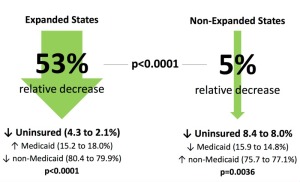Cancer patients in Medicaid expansion states saw increased care coverage
by
Lisa Chamoff, Contributing Reporter | October 02, 2017

Medicaid expansion under the Affordable Care Act greatly improved coverage for cancer treatment, cutting the uninsured rate in half in states that expanded the program, according to study presented Monday at the American Society for Radiation Oncology annual meeting.
The findings were based on a retrospective analysis of more than 197,000 patient records from the National Cancer Institute’s Surveillance, Epidemiology and End Results (SEER) database.
The researchers looked at the records of patients between the ages of 18 and 64 who received radiation therapy after being diagnosed with cancer between 2011 and 2014. They then compared insurance status and disparities in coverage both before and after Medicaid expansion in 2014, and after a 2012 Supreme Court ruling allowed Medicaid expansion to be optional for states.
The researchers found that 73 percent of the patients who were treated lived in states with fully expanded Medicaid programs.
While the number of uninsured cancer patients dropped from 2011 to 2014 in both the Medicaid expansion and non-expansion states, the states that did expand the program saw a greater drop. In states that expanded Medicaid, the uninsured rate declined a relative 52 percent, from 4.4 percent to 2.1 percent, while in states that chose not to expand, the uninsured rate dropped a relative 5 percent, from 8.4 to 8 percent. Non-expansion states actually saw a 1 percent decrease in Medicaid enrollment, from 15.9 percent to 14.9 percent.
Race and poverty levels appeared to be a factor in coverage in states that did not expand Medicaid. Only white patients in these states saw in an increase in coverage, while in states that expanded Medicaid, coverage increased regardless of race. States that expanded Medicare also saw a higher drop in uninsured rates for patients who lived in low-poverty areas, while in non-expansion states, the uninsured rate actually rose, by a relative two percent, in high-poverty areas.
“Future research should focus on how these changes in health care disparities may affect cancer outcomes,” said Dr. Fumiko Chino, a radiation oncology resident at the Duke University School of Medicine and lead author of the study, while presenting the study during a news briefing at ASTRO.
Chino, who specializes in studying the effects of financial strain on cancer patients, was inspired to enroll in medical school after her husband died of neuroendocrine carcinoma, leaving behind a mountain of debt.
“I’m hoping that we can move the needle in terms of cancer care and the overall health care debate,” Chino told HCB News. “It’s not enough to have anecdotes from patients. As scientists, we really need to prove that insurance patterns have changed. … I hope it will inform the ongoing debate.”
|
|
|
You Must Be Logged In To Post A Comment
|
